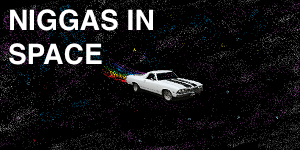

User Controls
Posts That Were Thanked by Meikai
-
2024-03-26 at 10:49 AM UTC in Are you looking forward to the big war with Iran?The following users say it would be alright if the author of this post didn't die in a fire!
-
2024-03-26 at 10:41 AM UTC in Francis Key Scott Bridge is Spectacularly Fucked
-
2024-03-26 at 10:39 AM UTC in Francis Key Scott Bridge is Spectacularly FuckedThe following users say it would be alright if the author of this post didn't die in a fire!
-
2024-03-26 at 9:59 AM UTC in Francis Key Scott Bridge is Spectacularly FuckedThe following users say it would be alright if the author of this post didn't die in a fire!
-
2024-03-26 at 9:59 AM UTC in Francis Key Scott Bridge is Spectacularly FuckedPlease to be moving your bridge sir. Do not obstruct.
-
2024-03-26 at 9:03 AM UTC in How Often Do You Guys Think About Killing Yourself?The following users say it would be alright if the author of this post didn't die in a fire!
-
2024-03-25 at 11:23 PM UTC in See this is why they’re hypocrites guysYeah it's crazy how no one agrees with you on reddit, here, in Lodz, in California. I think you're right though, Wariat.The following users say it would be alright if the author of this post didn't die in a fire!
-
2024-03-25 at 2:20 PM UTC in The TRT Thread: Its the end of the world as we know it so GET WHOLESOME editionThe following users say it would be alright if the author of this post didn't die in a fire!
-
2024-03-25 at 1:01 PM UTC in "The levant belongs to Israel!" "No it belongs to Palestine!"The following users say it would be alright if the author of this post didn't die in a fire!
-
2024-03-23 at 4:14 PM UTC in Foods and shit you've never tried.The following users say it would be alright if the author of this post didn't die in a fire!
-
2024-03-23 at 3:24 PM UTC in If People tried to start America today they would be arrested by the world powers and all killedI mean it did spark an actual warThe following users say it would be alright if the author of this post didn't die in a fire!
-
2024-03-23 at 3:23 PM UTC in If People tried to start America today they would be arrested by the world powers and all killedHow does that make you feel, LIKE A SLAVE????
Imagine if a bunch of people went to another COUNTRY and decided to just call it their own place wow sounds like ISIS
https://www.vice.com/en/article/jmbwbp/white-colony-in-namibia-773If you're white, racist and fed up with the grinding oppression of living in the West, where you're forced to rub shoulders with a small proportion of people who are not the same race as you, there's a new solution: move to Africa.
That's according to plans made by the users of one thread on 8chan—a cesspit for people who are too uninhibited in their internet vulgarity even for 4chan.
Here's how forum user "Kommandant" began his call for his white supremacist mates to join forces with him and create a new neo-Nazi utopia in Namibia [all sic]:
Advertisement
I just want to start by saying that no feat is too great, no task too arduous when done for the love of ones clan and ones blood. I have a hope for this future to prevail. And I know you can all see it too. It's an ember, but with just the right amount of breath it can become a raging fire. And all of Africa will see its beautiful glow in the night sky. Call it south West Africa, call it Rhodesia, Call it whatever you want.
In today's global landscape, the term "terrorism" evokes images of violence, fear, and political instability. It's a label applied swiftly and decisively by world powers to those who challenge the status quo. But what if we rewound history and looked at the birth of America through a contemporary lens? Would the founding fathers be hailed as heroes or labeled as terrorists?
The irony is stark: If the events of the American Revolution were to unfold in today's world, it's highly probable that the revolutionaries would be branded as terrorists and swiftly dealt with by the very powers they sought to oppose.
Imagine this scenario: A group of colonists, disgruntled by oppressive taxation, lack of representation, and stifling regulations, decide to take matters into their own hands. They organize themselves into militias, engage in acts of sabotage against government property, and openly defy the authority of the ruling regime. Their ultimate goal? To break free from the yoke of tyranny and establish a new nation founded on principles of liberty and democracy.
In the eyes of modern geopolitics, such actions would undoubtedly be condemned as acts of terrorism. The use of violence to achieve political ends, the targeting of symbols of state authority, and the disruption of public order would all be considered hallmarks of terrorism.
Moreover, the very act of secession itself would likely be deemed illegal under international law. The concept of national sovereignty and territorial integrity is fiercely guarded by the global community, and any attempt to unilaterally declare independence would be met with staunch opposition from the world's superpowers.
In this hypothetical scenario, the founding fathers would find themselves branded as outlaws, hunted down by the military forces of the British Empire and its allies. Instead of being celebrated as patriots and visionaries, they would be vilified as extremists and agitators.
But here's the twist: If the events of the American Revolution had unfolded in such a manner, we might still be living under British rule today. The very principles of liberty, democracy, and self-determination that we hold dear would have been stifled in their infancy, crushed under the boot heel of imperial authority.
This raises an important question: Are the actions of the founding fathers inherently justified simply because they led to the creation of a prosperous and free nation? Or are they only seen as such because history has deemed them victorious?
The irony of America's birth lies in the fact that the very actions that laid the foundation for our nation's independence would be condemned as terrorism if they were to occur today. It serves as a reminder that the labels we attach to historical events are often subjective and contingent upon the prevailing political climate.
Moreover, it underscores the complexities of power and authority in the modern world. While the United States champions the principles of liberty and democracy on the global stage, it also wields immense power and influence, often to the detriment of smaller nations and marginalized groups.The following users say it would be alright if the author of this post didn't die in a fire! -
2024-03-23 at 9 AM UTC in What are you thinking about....The following users say it would be alright if the author of this post didn't die in a fire!
-
2024-03-23 at 12:20 AM UTC in hello im an average adult in THESE TIMESmaybe stop taking so many drugsThe following users say it would be alright if the author of this post didn't die in a fire!
-
2024-03-23 at 12:06 AM UTC in hello im an average adult in THESE TIMEShi i woke up today and was anxious and the anxiousness made me feel anxiety so i popped some medication which is essentially watered down speed and then my kid said hi and i felt threatened which made me feel anxious so i took another dexie and then i thought about a black man which made me anxious and then i felt bad that i felt anxious which increased my anxiety anyway i was hoping you guys could calm me down by telling me about your anxiety and how you deal with itThe following users say it would be alright if the author of this post didn't die in a fire!
-
2024-03-22 at 2:02 PM UTC in i dont understand why these polish females dont know about oldje?The following users say it would be alright if the author of this post didn't die in a fire!
-
2024-03-22 at 11:35 AM UTC in What is the best milk?
Originally posted by Meikai MILKY MILKY WARM AND TASTY!
MOMMY! MILKY! PLEASE BE HASTY!
REFRESHING DRINK FROM MOMMY'S UDDERS!
I WANT MOMMY'S AND NO OTHER'S!
GIVE IT! GIVE IT! GIVE IT NOW!
GIVE ME MILKY, LAZY SOW!
UNTIL YOU DO I'LL SCREAM I'LL SHOUT!
I'M CRY I'LL WHINE AND STOMP ABOUT!
UNTIL MY BELLY IS FULL AND HAPPY!
I REFUSE TO TAKE A NAPPY! The following users say it would be alright if the author of this post didn't die in a fire!
The following users say it would be alright if the author of this post didn't die in a fire! -
2024-03-22 at 11:28 AM UTC in What is the best milk?The following users say it would be alright if the author of this post didn't die in a fire!
-
2024-03-21 at 10:21 PM UTC in How a nigger like me smoke and maintain
-
2024-03-21 at 10:17 AM UTC in Forum's total post count
Originally posted by Meikai We never had users. I suspect Lanny (correctly) views a large userbase as a liability. If those communities of long faded glory were the army, this site is a VFW bar.
I think it's worked out better in the long term anyway. Even though we are only at 38.25% of Zoklet's post count, we're at 200% of Zoklet's lifetime.The following users say it would be alright if the author of this post didn't die in a fire!


